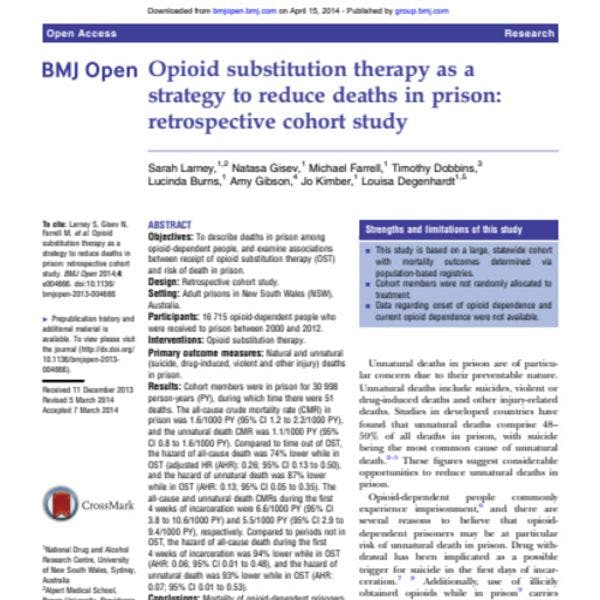Thérapie de substitution aux opiacés envisagée comme une stratégie pour réduire les décès dans les prisons: une étude de cohorte rétrospective
Cette étude examine l’impact qu’un programme de TSO peut avoir sur la réduction des risques de décès dans les prisons dans la Nouvelle-Galle du Sud, en Australie.
Pour en savoir plus, veuillez lire les informations ci-dessous (en anglais).
Abonnez-vous à l'Alerte mensuelle de l'IDPC pour recevoir des informations relatives à la politique des drogues.
Deaths in prison are a serious public health issue, raising questions as to the quality of care and supervision provided by correctional authorities. Reflecting such concerns, deaths in prison usually result in extensive postmortem inquiries and may also lead to litigation against correctional authorities and healthcare providers.
Unnatural deaths in prison are of particular concern due to their preventable nature. Unnatural deaths include suicides, violent or drug-induced deaths and other injury-related deaths. Studies in developed countries have found that unnatural deaths comprise 48–59% of all deaths in prison, with suicide being the most common cause of unnatural death. These figures suggest considerable opportunities to reduce unnatural deaths in prison.
Opioid-dependent people commonly experience imprisonment and there are several reasons to believe that opioid-dependent prisoners may be at particular risk of unnatural death in prison. Drug withdrawal has been implicated as a possible trigger for suicide in the first days of incarceration. Additionally, use of illicitly obtained opioids while in prison carries with it the risk of overdose. To the best of our knowledge, deaths in prison specifically among opioid-dependent people have not been described previously. Furthermore, no studies have considered whether treatment for opioid dependence during incarceration reduces mortality risk, as it does among opioid-dependent people residing in the community. In this study, we describe deaths in prison in a cohort of opioid-dependent people and examine whether receiving opioid substitution therapy (OST) reduces the risk of death in prison.
Keep up-to-date with drug policy developments by subscribing to the IDPC Monthly Alert.
Téléchargements
Sujets
Régions
Profils associés
- Sarah Larney
- Louisa Degenhardt
